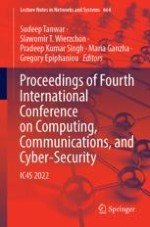2023 | OriginalPaper | Buchkapitel
Cyclone Intensity Detection and Classification Using a Attention-Based 3D Deep Learning Model
verfasst von : Y. Vahidhabanu, K. Karthick, R. Asokan, S. Sreeji
Erschienen in: Proceedings of Fourth International Conference on Computing, Communications, and Cyber-Security
Verlag: Springer Nature Singapore
Aktivieren Sie unsere intelligente Suche, um passende Fachinhalte oder Patente zu finden.
Wählen Sie Textabschnitte aus um mit Künstlicher Intelligenz passenden Patente zu finden. powered by
Markieren Sie Textabschnitte, um KI-gestützt weitere passende Inhalte zu finden. powered by
